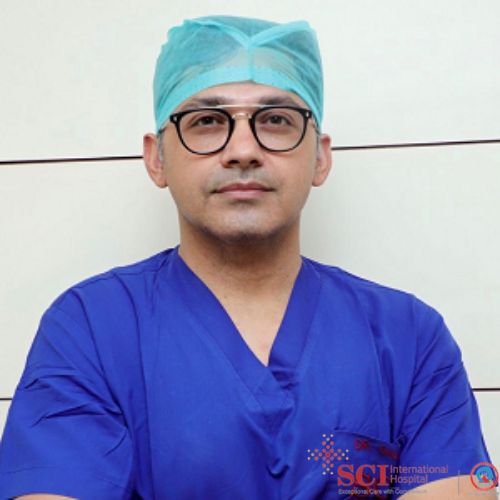Have you noticed a persistent bulge or discomfort in your abdomen or groin, especially when you cough, lift something heavy, or stand for a long time? This could be a hernia, a common condition that doesn't go away on its own.
While it can be worrying, the good news is that a permanent solution is available. At SCI Hospital, our expert surgeons specialize in hernia repair surgery, using the latest techniques to provide lasting relief and help you get back to your life, pain-free. Hernia Repair Surgery in Delhi.
We Are Rated
Consult Now
A hernia happens when a weak spot in your muscle or surrounding tissue allows an organ or tissue to push through. Think of it like a tear in a balloon where the air pushes out through the weak spot. This creates a visible bulge or lump that you can often see or feel under your skin.
Even if a small hernia doesn't cause problems at first, it will not heal by itself. Surgery is needed to fix it. This is because an untreated hernia can grow bigger and become more painful. More importantly, it risks becoming trapped. This means the tissue gets stuck. Or, it can become strangulated. This means the blood supply to the trapped tissue is cut off. This is a very serious, life-threatening situation that needs emergency surgery. Fixing a hernia helps avoid these dangerous problems.
Hernias can appear in different parts of the body. Each type pushes through a specific weak spot. Knowing the type helps doctors choose the best way to fix it.
Inguinal Hernia Repair (for groin hernias)
This is the most common type of hernia. It happens when part of the intestine or fatty tissue pushes through a weak spot in the lower belly muscles, in the groin area. It is much more common in men than in women.
Umbilical Hernia Repair (for belly button hernias)
This type occurs when tissue pushes out near your belly button. Umbilical hernias are common in babies and often close on their own. But in adults, these hernias usually get bigger over time. They often need surgery to be fixed.
Hiatal Hernia Repair (for upper stomach hernias)
A hiatal hernia happens when the upper part of your stomach pushes up into your chest. This happens through a small opening in the diaphragm. The diaphragm is the large muscle that separates your belly from your chest. This type of hernia can cause severe acid reflux. Acid reflux is when stomach acid flows back up into your food pipe, causing heartburn and other symptoms. This condition is also known as GERD.
Other Hernias (Incisional, Femoral, Diaphragmatic)
Besides the common types, other hernias can also occur:
Incisional Hernia: This type of hernia happens when tissue pushes out through the site of an old surgical scar. This area is often weaker after surgery.
Femoral Hernia: This is less common. Fatty tissue or part of the bowel pushes into the groin area, near the top of the inner thigh. Femoral hernias have a higher risk of becoming strangulated. This means the blood supply to the tissue is cut off, which is dangerous.
Diaphragmatic Hernia: In this type, organs from your belly move into your chest through a hole in the diaphragm. This condition is often present from birth.
When you need hernia repair, choosing the right surgical method is very important for a good recovery. Your surgeons at SCI Hospital will look at your specific hernia and your overall health. Then they will suggest the best procedure for you.
Laparoscopic Hernia Repair Surgery: The Minimally Invasive Choice
This modern surgery is also known as "keyhole surgery." It involves several very small cuts, usually less than an inch long. The surgeon uses a thin tube with a camera and light, called a laparoscope. This lets them see the hernia on a screen. Tiny surgical tools are then used to push the tissue back into place. A special mesh is often used to make the weak spot strong again.
Traditional Open Hernia Repair Surgery: The Time-Tested Method
In open surgery, the surgeon makes a single, larger cut. This cut is usually about two to three inches long, right over the hernia. The bulging tissue is gently pushed back into the belly. Then, the weakened muscle wall is stitched closed. In most cases, a piece of mesh is also placed.
Which is Better for Hernia Repair: Laparoscopy or Open Surgery?
The best choice for hernia repair depends on many things. These include the type and size of your hernia, your overall health, and your surgeon's experience.
No, surgery is the only way to permanently fix a hernia. Other methods are just for managing the symptoms, not curing the problem. For very small hernias that don't cause any symptoms, a doctor might suggest "watchful waiting." This means they will just keep an eye on it.
Understanding what to expect after your hernia repair surgery is important for a smooth recovery.
Your Recovery Timeline: From Hospital to Home
Most hernia repair surgeries are done as outpatient procedures. This means you can often go home on the same day as your surgery. First Few Days: You can expect some soreness, swelling, and bruising around the area where you had surgery. Pain can be managed with the medicine your doctor gives you, or with over-the-counter pain relievers.
Choosing the right hospital and surgical team is a big decision for hernia repair. At SCI Hospital, our expert surgeons specialize in hernia repair surgery. They use the latest techniques to provide lasting relief. We focus on getting you back to your life, pain-free, with high-quality care.

MBBS, MS - General Surgery, MCh - Urology/Genito-Urinary Surgery, Urologist, Urological Surgeon, Andrologist

MBBS, MS - General Surgery, MCh - Urology, Urologist, Andrologist, Urological Surgeon
Understanding the cost of your hernia repair surgery is an important part of your decision-making process.
Average Cost and Factors That Affect Pricing
The cost of hernia surgery in Delhi can vary a lot. Several things affect the price:
At SCI Hospital, we aim to make the billing process clear and easy to understand. We can help you understand your insurance coverage for hernia repair surgery. Our team is here to answer your questions about costs and help you navigate your payment options.
The hernia repair operation at SCI Hospital usually takes between 30 and 90 minutes, depending on the complexity of the hernia and the surgical method used. You can book an appointment with our expert surgeons to discuss your specific case and schedule your surgery.
At SCI Hospital, our experienced surgeons follow a standard procedure for inguinal hernia repair, which includes anesthesia, incision, hernia reduction, wall reinforcement, and closure. You can call us or book an online consultation to learn more about the process and schedule your surgery.
The success rate for hiatal hernia surgery at SCI Hospital is very high, with most patients experiencing significant relief from symptoms like acid reflux. Our surgeons use advanced techniques, such as laparoscopic fundoplication, to ensure the best possible outcomes. You can schedule an appointment with our experts to discuss your options and book your surgery.
While hernia repair is a safe procedure, there are some potential risks, such as infection, bleeding, or fluid buildup. However, these complications are rare, and our experienced surgeons at SCI Hospital take every precaution to minimize them. You can book an offline consultation or call us to discuss any concerns you may have and schedule your surgery.
Consult Now
